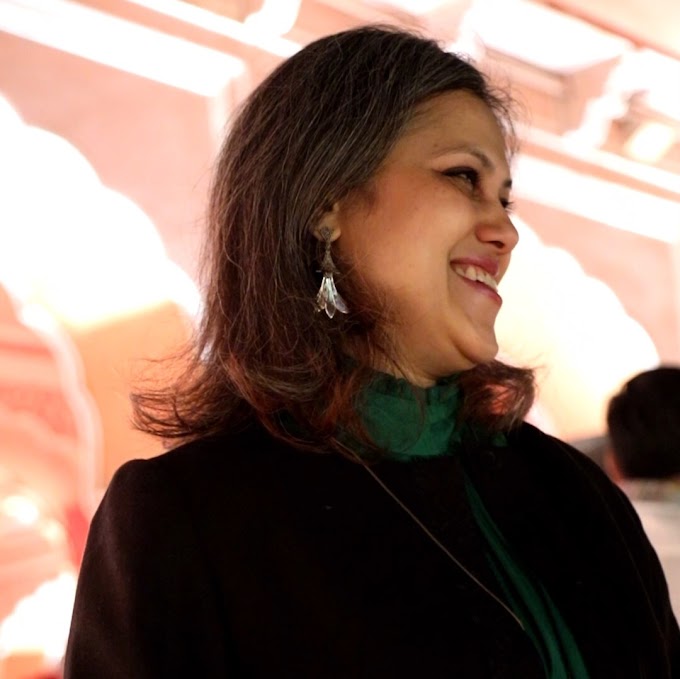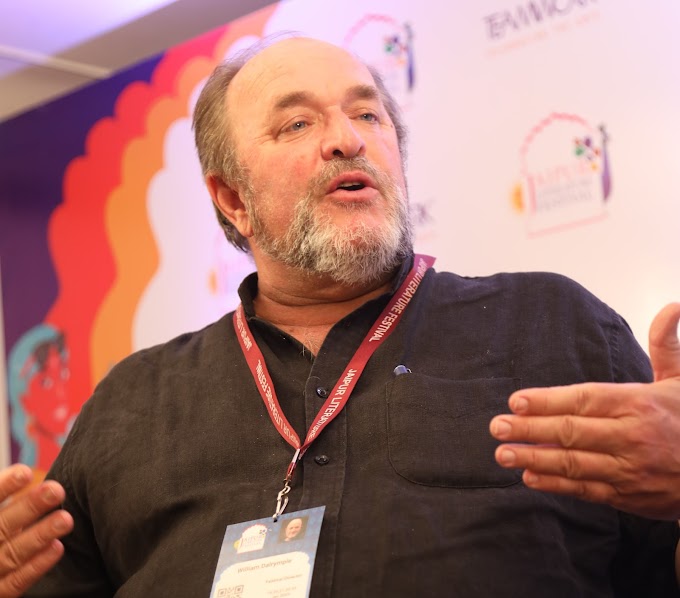The keynote address at the Jaipur Literature Festival is delivered by a prominent figure in the literary world, who is chosen after careful deliberation for their exceptional contributions to the field of literature. The speaker is given a platform to share their thoughts, ideas, and insights on the current state of literature, as well as its future direction. The keynote address is seen as a significant part at the JLF as it sets the tone for the rest of the festival and provides a broad perspective on the literary landscape.
One of the main
reasons for the significance of the keynote address is that it provides a
platform for the speaker to share their ideas and insights on a global level.
The JLF attracts a diverse audience from all over the world, and the keynote
address is an opportunity for the speaker to reach a global audience and share
their thoughts with a diverse group of people. This is particularly important
in today's globalized world, where literature plays a crucial role in shaping
our understanding of different cultures and societies.
The keynote
address also serves as a means of fostering dialogue and exchange of ideas
between different literary traditions and cultures. The JLF brings together
authors and intellectuals from different parts of the world, each with their
own unique literary traditions and perspectives. The keynote address helps to
foster a deeper understanding and appreciation of different literary traditions
and cultures. Further, the keynote address also plays a significant role in
shaping the literary discourse of the festival. The keynote address sets the
tone for the rest of the festival and provides a broad perspective on the
literary landscape, which helps to guide the discussions and debates that take
place throughout the festival.
In addition to its
significance in shaping the literary discourse of the festival, the keynote
address also plays a significant role in shaping the literary discourse of the
wider world. The JLF is considered to be one of the most prominent literary
festivals in the world, and the keynote address is often covered by
international media. This means that the ideas and insights shared by the
keynote speaker have the potential to reach a global audience and shape the
literary discourse on a global level.
Who is the 2023 Keynote Speaker?
Abdulrazak Gurnah
is a Tanzanian-British novelist and academic who was awarded the 2021 Nobel
Prize in Literature. He was born in Zanzibar in 1948 and received his primary
and secondary education in Tanzania before moving to the United Kingdom to
pursue higher education. Gurnah's novel, "Admiring Silence," was
published in 1996 and was shortlisted for the Booker Prize. The novel tells the
story of a young man's journey to England in search of his brother, and
explores themes of identity, displacement, and the effects of colonialism. Gurnah's
subsequent novels include "Paradise" (1999), which was also
shortlisted for the Booker Prize, "By the Sea" (2001), and
"Desertion" (2005). These novels have been praised for their
exploration of the complexities of the postcolonial experience and the ways in
which history shapes individual lives.
 |
| Image courtesy: JLF website |
In awarding Gurnah
the Nobel Prize in Literature, the Swedish Academy cited his "polyphonic
writings, which with circumspection and empathy, give voice to the silenced and
marginalized." Gurnah is the first Tanzanian writer to be awarded the
Nobel Prize in Literature and his work is considered an important contribution
to the world of literature and postcolonial studies.
Likely themes he may touch upon:
The 2021 Nobel
Prize in Literature winner, Abdulrazak Gurnah, should address the pressing
issues of censorship and increasing attacks against writers in his keynote
address at the Jaipur Literature Festival. These issues are prevalent in many
countries around the world, and it is important for writers and literary
figures to speak out against them and advocate for freedom of expression.
Censorship is often
used to silence dissenting voices and control the narrative of what is
considered acceptable. This can include censorship of books, newspapers, and
other forms of media, as well as censorship of speech and expression. The
impact of censorship on writers is severe, as it limits their ability to
express themselves freely and to reach audiences with their work.
The challenges
faced by writers in the face of censorship and attacks are not only a threat to
freedom of expression, but also to the literary landscape around the world.
Without the ability to freely express themselves, writers are unable to create
meaningful and impactful works. This has a detrimental effect on the cultural
and intellectual fabric of society.
In his keynote
address, Abdulrazak Gurnah should speak out against censorship and attacks on
writers. He should call on governments and other actors to respect and protect
the rights of writers, and to ensure that they are able to express themselves
freely. He should also call on writers and literary figures to speak out
against censorship and attacks, and to support each other in the face of these challenges.
Furthermore,
Abdulrazak Gurnah should also discuss the importance of diversity and
representation in literature. The literary landscape around the world is often
dominated by a small group of voices, and it is important for writers from
marginalized communities to have the opportunity to share their perspectives
and experiences. This can help to broaden the cultural and intellectual
landscape, and to create a more inclusive and equitable society.
One area that
would be particularly relevant to his work is translations and multilingualism,
given that his first language is Swahili and he integrates bits of several
languages such as Swahili, Arabic and German into most of his writings.
In his keynote
address, Gurnah could discuss the importance of translations in literature.
Translations allow readers from all over the world to access and understand
works written in languages other than their own. This is especially important
for works written in languages like Swahili, which are not as widely spoken or
studied as languages like English or Spanish. Translations also allow for a
greater understanding of different cultures, perspectives and literary
traditions.
Gurnah could also
address the challenges that come with translating literature. Translating a
work of literature is not simply a matter of replacing one word with another,
but rather it requires a deep understanding of the original language, culture,
and context. Translators must also make decisions about how to convey the
meaning and style of the original work in the target language. Gurnah could
speak about how these challenges have affected his own work and how they have
been addressed by translators who have translated his work into other
languages.
Another important
topic that Gurnah could address is multilingualism. Multilingualism is a
characteristic that is common in many parts of the world and it is becoming
increasingly important in today’s globalized world. Gurnah could speak about
how multilingualism has influenced his writing and how it has shaped his
understanding of different cultures and languages. He could also discuss how
multilingualism has affected his experiences as a writer and how it has been
received by readers from different cultures and backgrounds.
Gurnah could also
speak about the role of multilingualism in literature and how it can be used to
convey meaning and to create a sense of place. Multilingualism can be used to
create a sense of authenticity, as well as to reflect the cultural and
linguistic diversity of a particular place. Gurnah could discuss how he has
used multilingualism in his writing to create a sense of place and how it has
been received by readers.
Then, Gurnah
could address the future of translations and multilingualism in literature.
With the increasing global interconnectedness, translations and multilingualism
will become even more important in the future. Gurnah could discuss how he sees
the future of translations and multilingualism in literature and how he thinks
it will affect the way we read and write literature. He could also discuss the
role that literature and translations can play in creating a more inclusive and
culturally diverse world.
As a writer who
has had to push back against publishers who wanted to "italicize or
Anglicize Swahili and Arabic references and phrases in his books," Gurnah
has a deep understanding of the challenges that writers face when trying to
publish work that is true to their culture and heritage. In his keynote address
at the Jaipur Literature Festival, Gurnah should address the ways in which
writers can navigate this relationship and the importance of preserving
cultural authenticity in the publishing process.
One of the main
challenges that writers face when working with publishing houses is the
pressure to conform to Western literary norms. Publishers often want to make
the "alien seem alien" by marking "foreign" terms and
phrases with italics or by putting them in a glossary. This can be frustrating
for writers who want to preserve the cultural authenticity of their work.
Gurnah should discuss the importance of standing up for oneself as a writer and
pushing back against these types of requests. He should also speak to the
importance of finding publishers who are open to and respectful of different
cultures and literary styles.
He should address
how diasporic experiences have the potential to enrich and alter English
language and literature in his keynote address at the Jaipur Literature
Festival. Diaspora, defined as the dispersal of a people from their original
homeland, has been a significant aspect of human history. This dispersal has
led to the blending of cultures and languages, resulting in a unique form of
expression and storytelling. The experiences of diasporic individuals have the
potential to bring new perspectives, voices, and themes to the English language
and literature.
One of the ways
diasporic experiences can enrich English literature is through the introduction
of new and diverse perspectives. Diasporic individuals come from different
cultural backgrounds, and their experiences and perspectives reflect this
diversity. They bring new ideas and themes to the English language and
literature, which can challenge and broaden the traditional understanding of
the world. This can lead to a more inclusive and diverse literary landscape,
where different voices are represented and heard.
The blending of
cultures and languages is another way diasporic experiences can alter English
language and literature. Diasporic individuals often find themselves in a
multilingual environment, and this can lead to the incorporation of different
languages and dialects into their writing. This can lead to a new form of
expression and storytelling, which can challenge traditional notions of
language and literature. This blending of languages and cultures can also lead
to the creation of new literary forms and genres, which can be unique and
exciting.
Diasporic
experiences can also lead to the exploration of new themes and issues.
Diasporic individuals often find themselves in a state of displacement and
alienation, and this can lead to the exploration of themes such as identity,
belonging, and home. These themes can be universal and relatable, and they can
resonate with readers from different backgrounds. Diasporic literature can also
address issues such as racism, discrimination, and prejudice, which can be
important to raise awareness about and to challenge.
And, of course, we will be eager to see what the festival organisers speak in their addresses.



